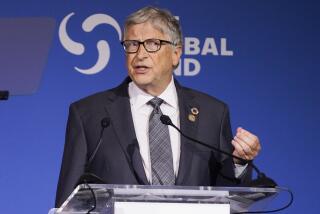Study: Utah’s the most generous state. How does yours measure up?
- Share via
Utah is the most generous state, and New Hampshire the least -- that is, according to a new data on philanthropy and religion.
The more religious a state’s residents, the more generous they were with their discretionary income, a study released Monday by the Chronicle of Philanthopy reported.
After Utah, the most-generous states were Mississippi, Alabama, Tennessee and South Carolina. The least generous, second to New Hampshire, were Maine, Vermont, Massachusetts and Rhode Island.
The data paint a broad picture of the relationship between religion and charity. The Chronicle study examined $135.8 billion in donations. The median donation was $2,564. Americans, on average, donated 4.6% of their discretionary income.
Researchers looked at how much each state claimed in charitable deductions on 2008 federal income tax records. The study examined percent of discretionary income -- what’s left after households pay for housing, food, living expenses and taxes -- to reduce variables, such as the cost of living.
The South -- including much of the so-called Bible belt -- donated on average 5.7% of discretionary income. The Northeast, closer to 4.1%.
The study ranks each state individually
Utah, which is more than 60% Mormon, gave 10.6% of its discretionary income to charity in 2008. The figure isn’t that surprising given that tithing is an integral part of life in the Church of Jesus Christ of Latter-day Saints.
In New Hampshire, just 2.5% of disposable income was donated to charity. New Hampshire has one of the lowest levels of religious commitment in the country, according to a Gallup poll. Just over half the state’s residents considered themsevles “nonreligious” when surveyed this year.
The data can be sliced multiple ways, including along political lines. Eight of the 10 most generous states voted for John McCain in 2008. Nine of the 10 least generous voted for Barack Obama.
That breakdown could be tied to religion as much as politics, Chronicle assistant managing editor Peter Panepento told the Associated Press. The least-generous states, which tended to be blue, were the least religious, whereas the most generous were red and more religious.
“I don’t know if I could go out and say it’s a complete Republican-Democrat difference as much as it is different religious attitudes and culture in these states,” Panepento told the AP.
Charitable donations are listed on Schedule A, a form where people seeking a tax deduction report the amount of each donation they made. The Chronicle only included incomes of $50,000 or more in the study, due to what researchers called discrepancies in the federal tax data.
The study also offers up somewhat surprising facts. New Jersey, for example, ranks eighth in total giving with $4.5 billion in contributions. “But the share of discretionary income donated by typical households is relatively low, at 3.7 percent,” the study said.
California, the study notes, ranked first overall in total charitable contributions, accounting for nearly $1 out of every $8 given to charity.
“Individually, Californians are average in their level of giving, with the typical household donating 4.4% of discretionary income,” the study reported. “The state’s biggest cities show a big disparity in giving rates among the largest metropolitan areas: Los Angeles ranks No. 12, followed by Riverside (15), Sacramento (36), San Diego (39), and San Francisco (43).”
ALSO:
Plane crashes into Long Island neighborhood; 2 dead
Amelia Earhart mystery: New evidence, right spot, searchers say
Augusta, home of the Masters golf tournament, admits first women
Follow Laura on Twitter. Email: laura.nelson@latimes.com
More to Read
Sign up for Essential California
The most important California stories and recommendations in your inbox every morning.
You may occasionally receive promotional content from the Los Angeles Times.











